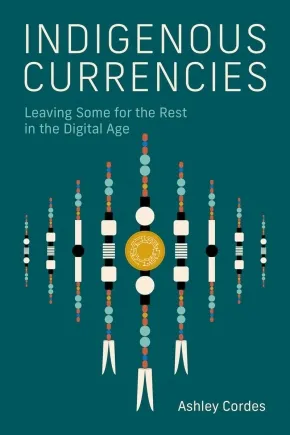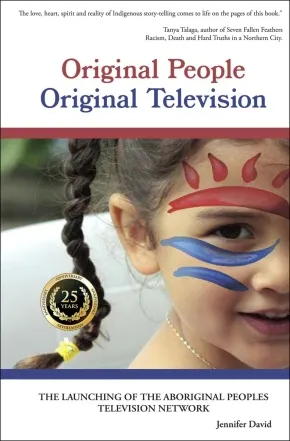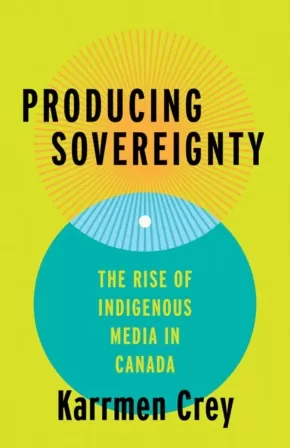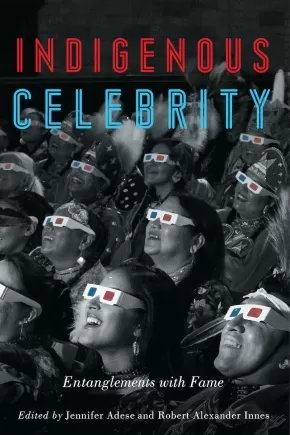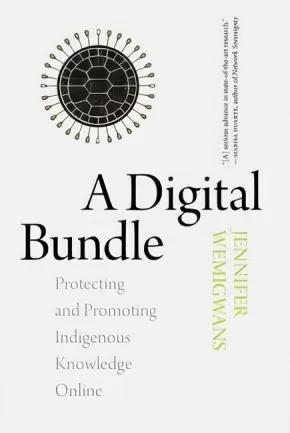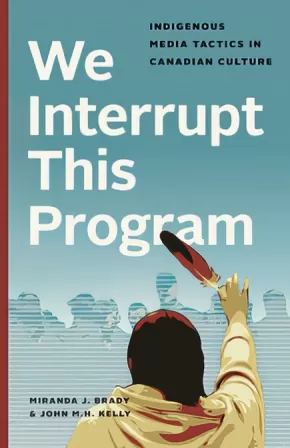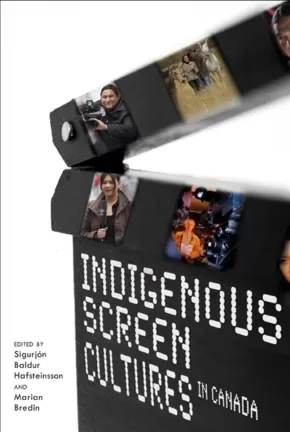Media / Technology
Synopsis:
The groundbreaking Indigenous style guide every writer needs.
The first published guide to common questions and issues of Indigenous style and process for those who work in words and other media is back in an updated new edition. This trusted resource offers crucial guidance to anyone who works in words or other media on how to work accurately, collaboratively, and ethically on projects involving Indigenous Peoples.
Editor Warren Cariou (Métis) and contributing editors Jordan Abel (Nisga’a), Lorena Fontaine (Cree-Anishinaabe), and Deanna Reder (Cree-Métis) continue the conversation started by the late Gregory Younging in his foundational first edition. This second conversation reflects changes in the publishing industry, Indigenous-led best practices, and society at large, including new chapters on author-editor relationships, identity and community affiliation, Two-Spirit and Indigiqueer identities, sensitivity reading, emerging issues in the digital world, and more.
This guide features:
- Twenty-two succinct style principles.
- Advice on culturally appropriate publishing practices, including how to collaborate with Indigenous Peoples, when and how to seek the advice of Elders, and how to respect Indigenous Oral Traditions and Traditional Knowledge.
- Terminology to use and to avoid.
- Advice on specific editing issues, such as biased language, capitalization, citation, accurately representing Indigenous languages, and quoting from historical sources and archives.
- Examples of projects that illustrate best practices.
Additional Information
208 pages | 5.50" x 7.50" | Paperback
Synopsis:
How Indigenous currencies—including wampum and dentalium shells, beads, and the cryptocurrency MazaCoin—have long constituted a form of resistance to settler colonialism.
Indigenous Currencies follows dynamic stories of currency as a meaning-making communication technology. Settler economies regard currency as their own invention, casting Indigenous systems of value, exchange, and data stewardship as incompatible with contemporary markets. In this book, Ashley Cordes refutes such claims and describes a long history of Indigenous innovation in currencies, including wampum, dentalium, beads, and, more recently, the cryptocurrency MazaCoin. By looking closely at how currencies developed over time through intercultural communication, Cordes argues that Indigenous currencies transcend the scope of economic value, revealing the cultural, social, and political context of what it means to exchange.
The book’s two main case studies, the gold rush and the code rush, frame a deep dive into how Indigenous ways of being have shaped the use and significance of currency and vice versa. Settler currencies, which have developed in the wake of wars and through massively scaled forms of material extraction, offer a very different story of the place of currencies within settler economies of dispossession. The second part of the study asks how contemporary cryptocurrencies may play a critical role in cultivating Tribal sovereignty. The author analyzes structural properties of the polymorphic blockchain to provide key insights into how emergent digital spaces, with their attendant forms of meaning and value represented by code, NFTs, and Web 3.0, are inextricably connected to Indigenous knowledges. The book cultivates a vision of currency in which the principle of leaving some for the rest establishes a way of imagining relationships of exchange beyond their enclosure within settler-capitalist parameters of extraction and into currents of deep reciprocity.
Reviews
"Brilliantly written in the best of Coquille Nation practices, wisdom of ancestors, and traditional technologies, Indigenous Currencies is a gift guiding us through deep insights for the digital realm."—Tiara R. Na’puti, University of California, Irvine
"Indigenous Currencies is an unparalleled study of cryptocurrency's colonialism and Indigenous decolonial possibilities in this powerful space. Cordes takes Indigenous epistemologies to places previously unexamined, and she does so by grounding case studies in practices of Indigenous digital agency."—Jason Edward Black, University of North Carolina at Charlotte; author of Mascot Nation
Educator Information
226 pages | 6.06" x 9.00" | 22 b&w illustrations | Paperback
Synopsis:
Original People, Original Television is the behind-the-scenes account of a little known revolution in Canadian broadcasting—a journey begun in 1922 with Nanook of the North, wending its way across generations and the width and breadth of the traditional territories of the Inuit, First Nations and Métis; culminating in the 1999 launch of the world’s inaugural Indigenous led broadcast, the Aboriginal Peoples’ Television Network.
Additional Information
282 pages | 9.00" x 6.00" | b&w photos, index, bibliography | Special Edition | Paperback
Synopsis:
Exploring how Indigenous media has flourished across Canada from the 1990s to the present
In the early 1990s, Indigenous media experienced a boom across Canada, resulting in a vast landscape of film, TV, and digital media. Coinciding with a resurgence of Indigenous political activism, Indigenous media highlighted issues around sovereignty and Indigenous rights to broader audiences in Canada. In Producing Sovereignty, Karrmen Crey considers the conditions—social movements, state policy, and evolutions in technology—that enabled this proliferation.
Exploring the wide field of media culture institutions, Crey pays particular attention to those that Indigenous media makers engaged during this cultural moment, including state film agencies, arts organizations, provincial broadcasters, and more. Producing Sovereignty ranges from the formation of the Aboriginal Film and Video Art Alliance in the early 1990s and its partnership with the Banff Centre for the Arts to the Canadian Broadcasting Corporation’s 2016 production of Highway of Tears—an immersive 360-degree short film directed by Anishinaabe filmmaker Lisa Jackson—highlighting works by Indigenous creators along the way and situating Indigenous media within contexts that pay close attention to the role of media-producing institutions.
Importantly, Crey focuses on institutions with limited scholarly attention, shifting beyond the work of the National Film Board of Canada to explore lesser-known institutions such as educational broadcasters and independent production companies that create programming for the Aboriginal Peoples Television Network. Through its refusal to treat Indigenous media simply as a set of cultural aesthetics, Producing Sovereignty offers a revealing media history of this cultural moment.
Reviews
"Producing Sovereignty is a must-read for those interested in the theoretical fundamentals of Indigenous media studies. By unearthing and revealing the subjugated histories and materiality of Indigenous artists and filmmakers, Karrmen Crey provides a crucial lens into the co-constitutive production of Indigenous aesthetics as an outcome of institutional contestations."—Brendan Hokowhitu, University of Queensland
"One of the most engaging and sophisticated books in the field, Producing Sovereignty uses highly immersive case studies to locate Indigenous media within wider social movements and cultural developments in North America. Karrmen Crey speaks to the decolonizing force of Indigenous media—not only as expressions of Indigenous cultural sovereignty but as destabilizing forces within contemporary settler societies."—Marian Bredin, coeditor of Canadian Television: Text and Context
Additional Information
224 pages | 5.50" x 8.50" | 25 black and white illustrations | Paperback
Synopsis:
Indigenous Celebrity speaks to the possibilities, challenges, and consequences of popular forms of recognition, critically recasting the lens through which we understand Indigenous people’s entanglements with celebrity. It presents a wide range of essays that explore the theoretical, material, social, cultural, and political impacts of celebrity on and for Indigenous people. It questions and critiques the whitestream concept of celebrity and the very juxtaposition of “Indigenous” and “celebrity” and casts a critical lens on celebrity culture’s impact on Indigenous people.
Indigenous people who willingly engage with celebrity culture, or are drawn up into it, enter into a complex terrain of social relations informed by layered dimensions of colonialism, racism, sexism, homophobia/transphobia, and classism. Yet this reductive framing of celebrity does not account for the ways that Indigenous people’s own worldviews inform Indigenous engagement with celebrity culture––or rather, popular social and cultural forms of recognition.
Indigenous Celebrity reorients conversations on Indigenous celebrity towards understanding how Indigenous people draw from nation-specific processes of respect and recognition while at the same time navigating external assumptions and expectations. This collection examines the relationship of Indigenous people to the concept of celebrity in past, present, and ongoing contexts, identifying commonalities, tensions, and possibilities.
Reviews
“Indigenous Celebrity is an indispensable, paradigm-shifting study of celebrity that centres Indigenous meaning-making, epistemologies, kinship, and world views, even as it remains attuned to the historical and continuing effects of settler-colonial and other colonizing celebrity systems and dynamics upon Indigenous celebrity. From its analyses of Indigenous celebrity activism, to Indigenous sport celebrity, to celebritized “last” speakers of Indigenous languages, to Indigenous celebrity in Australia and India, and beyond, this thoughtful collection builds a compelling broad-based analysis that is attentive to the crucial specificities of place and community. The burgeoning field of celebrity studies dearly needs this book.” — Lorraine York
“Indigenous Celebrity is the first book to look at celebrity through an Indigenous lens. It addresses a significant gap in the literature – for Indigenous/Native/Aboriginal studies, for celebrity and fame studies, and as a comparative resource for social and cultural studies.” — Julie Pelletier
Educator Information
Other contributors: Daryl Adair, Kim Anderson, Renée E. Mzinegiizhigoo-kwe Bédard, Aadita Chaudhury, Jenny L. Davis, Karen Fox, Christina Giacona, Jonathan G. Hill, Brendan Hokowhitu, Kahente Horn-Miller, David Lakisa, Sheryl Lightfoot, Virginia McLaurin, w. C. sy, Tracy Taylor, Katerina Teaiwa.
Topics: Film & Media Studies, Indigenous Studies, Popular Culture, Social Science
Additional Information
272 pages | 6.00" x 9.00" | index, bibliography
Synopsis:
An essential contribution to Internet activism and a must read for Indigenous educators, A Digital Bundle frames digital technology as an important tool for self-determination and idea sharing, ultimately contributing to Indigenous resurgence and nation building.
By defining Indigenous Knowledge online in terms of “digital bundles,” Jennifer Wemigwans elevates both cultural protocol and cultural responsibilities, grounds online projects within Indigenous philosophical paradigms, and highlights new possibilities for both the Internet and Indigenous communities.
Reviews
"This must-read book based on extensive research, dialogue, and consultation with Indigenous Elders, leaders, artists, and academics helps to address the new risks, ethical questions, and challenges for how Indigenous Knowledge can be accessed, appropriately used, published, and transformed using multiple communication and digital forms. It offers the protocols, stories, advice, practices, and wisdom from Indigenous Knowledge holders to help address the challenges and questions about how Indigenous Knowledge can live now and in the future in its divergent forms with new forms of technology. " — Marie Battiste, author of Decolonizing Education and founder of the Aboriginal Education Research Centre, University of Saskatchewan
"An invaluable case-study in how to ethically write and conduct a research project in Indigenous studies. .. this book is a must-read for any researcher writing on Indigenous topics. " —Transmotion
"A necessary intervention into the conversations and classifications of the digital age happening all too often without Indigenous perspective or contribution. " —Journal of Native Studies
"[A] welcome intervention into discussions of the digital age, where the rich possibilities and ethical practices coming from Indigenous scholars and cultural activists such as Wemigwans are sorely needed. This important new book is a kind of guide for scholars, activists, media makers, and visionaries as to how we might collectively imagine Indigenous cultural futures with mindful use of digital technologies across the globe. " — Faye Ginsburg, director of the Center for Media, Culture and History, New York University
Additional Information
224 pages | 6.00" x 9.00"
Synopsis:
We Interrupt This Program tells the story of how Indigenous people are using media tactics in the realms of art, film, television, and journalism to rewrite Canada’s national narratives from Indigenous perspectives.
Miranda Brady and John Kelly showcase the diversity of these interventions by offering personal accounts and reflections on key moments – witnessing survivor testimonies at the Truth and Reconciliation Commission, attending the opening night of the ImagineNative Film + Media Festival, and discussing representations of Indigenous people with artists such as Kent Monkman and Dana Claxton and with CBC journalist Duncan McCue. These scene-setting moments bring to life their argument that media tactics, as articulations of Indigenous sovereignty, have the power not only to effect change from within Canadian institutions and through established mediums but also to spark new forms of political and cultural expression in Indigenous communities and among Indigenous youth.
Theoretically sophisticated and eminently readable, We Interrupt This Program reveals how seemingly unrelated acts by Indigenous activists across Canada are decolonizing our cultural institutions from within, one intervention at a time.
This book will appeal to wide spectrum of readers – from students and scholars in communications and media studies to those with a general interest in Canadian art, culture, history, journalism, anthropology, and Indigenous studies.
Reviews
"...the book chronicles the breadth of media interventions employed by Aboriginal media creators, foregrounding Indigenous worldviews, agency and resilience while challenging colonial myths. It is a vital resource for anyone seeking to understand Indigenous cultural expression in Canada in the digital age." — Brad Clark, Journalism and Broadcast Media Studies at Mount Royal University, Canadin Journal of Native Studies, Vol. 38, No. 1, January 2018
"[We Interrupt this Program] provides an analytical perspective to help readers reflect on what types of new interruptions may be brewing – or to plan the interventions themselves." — Greg Macdougall, Briarpatch Magazine, June 2018
Educator Information
Table of Contents
Introduction: Indigenous Media Tactics
1 Media Practices and Subversions: Survivor Testimonials in the Truth and Reconciliation Commission
2 IsumaTV’s “Testimony by Isuma”: Online Expressions of Inuit Culture and Assimilation
3 Redfacing, Remediation, and Other Indigenous ArtTactics: Challenging Cultural Institutions
4 imagineNATIVE as Industry Intervention: Supporting and Growing Indigenous Media Makers
5 Reporting News in Indigenous Communities: A Conversation with Journalist Duncan McCue on Respect and Relationality
Conclusion: Media Tactics Old and New
Notes; Works Cited; Index
Additional Information
220 pages | 5.50" x 8.50" | 14 B&W Photos
Synopsis:
Indigenous media challenges the power of the state, erodes communication monopolies, and illuminates government threats to indigenous cultural, social, economic, and political sovereignty. Its effectiveness in these areas, however, is hampered by government control of broadcast frequencies, licensing, and legal limitations over content and ownership.
Indigenous Screen Cultures in Canada explores key questions surrounding the power and suppression of indigenous narrative and representation in contemporary indigenous media. Focusing primarily on the Aboriginal Peoples Television Network, the authors also examine indigenous language broadcasting in radio, television, and film; Aboriginal journalism practices; audience creation within and beyond indigenous communities; the roles of program scheduling and content acquisition policies in the decolonization process; the roles of digital video technologies and co-production agreements in indigenous film making; and the emergence of Aboriginal cyber-communities.
Additional Information
200 pages | 6.00" x 9.00"




